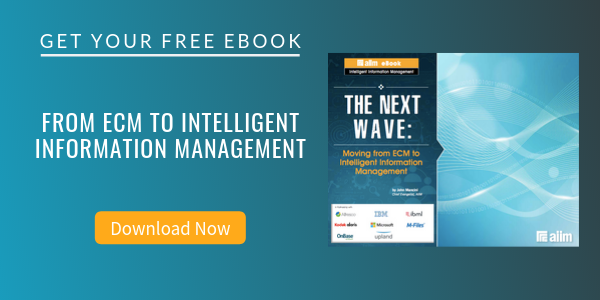
How to Improve Digital Productivity?
Productivity | Intelligent Information Management (IIM)
Many corporations waste their IT budgets on the “T" instead of benefiting from the “I" in IT. Information can be used to reduce costs, manage risks, add value, or even create a "blue ocean" opportunity. Let me therefore give you two ways you can change the game and make a dent in the universe.
Top-Down Reform
The average annual corporate productivity in the US grew from 1.6% to 3.3% from 1995 to 2004, but we have since then (both before and after the recession) seen a decline in average annual productivity growth from 3.3% to 1.8%. Enterprise IT helped to fuel the growth from 1995 to 2004, but have since then failed to deliver value. The decline in productivity is, according to the Federal Reserve Bank of San Francisco, most visible in information and IT-intensive industries.
Executives can change this by making digital productivity a priority. I just met with a large construction company that had set a 5% productivity improvement target, and the best innovations happen when you are forced and incentivized to change. Information management is key to improving productivity in information-intensive industries. Therefore, we asked 400+ of our members about expected or realized benefits of information management technologies, and here are some of the findings:
- Automation – Improve productivity of administrative staff by 33.5% (in average) with using work-flowed scanned forms and documents
- Control – Reduce legal costs, fines, and damages by 25% (in average) by applying best practice procedures to records management, security, and e-Discovery
- Engagement - Improve customer service levels and response times by 32.2% (in average) by providing immediate access to all customer-related and case-related information that you hold
- Insights - Improve productivity of professional staff by 30.9% (in average) by ensuring they can find internal information and documents as quickly and as easily as they find information on the web
We need a corporate mandate to improve corporate productivity. Allocate staff and resources to this, and kick-off a strategic new ways of working (WOW) initiative. Set top-down targets and metrics, get quick wins that you celebrate across the organization, and transform your organization. Aim for the stars, not safe and minor improvements.
Bottom-Up Revolution
Revolutions never come from the top; they come from workers and their struggles. The Enterprise IT dictatorship has since 2005 failed to deliver the necessary reforms to improve corporate productivity, while consumer IT has conquered the world. Executives should ask themselves about how to best identify, test, and deploy new technologies that can transform the business. It’s not business as usual anymore, and we need to learn from consumer technologies and their empowerment.
Don’t rely on your IT department to be the center of IT innovations. Most of them have failed miserable at this for last 10 years. And don’t expect the business executives to be the technology visionaries – they are often the victims of previous successes. The answer have to be your staff and knowledge workers, - they are the ones that have to be encouraged and incentivized to identify and test new technologies and ways of working. Don’t only go for BYOD (Bring Your Own Device), open also up for BYOA (Bring Your Own App) based on corporate guidelines.
A higher degree of employee involvement and trust should also improve the level of engagement. Gallup research has shown that this affects customer service by 10%, productivity by 21%, and profitability by 22%. In short, empower your staff to transform your organization.
With more freedom comes greater responsibility. Therefore, we need to better educate employees on how to best share and control information. We need corporate metadata, taxonomy, and security standards to ensure we can connect people, information, and knowledge across applications and devices. And we need an information governance framework for ensuring information management compliance.
- Ensure: executive direction; polities and procedures; training
- Detect: audit; leverage ombudspersons; workshops
- Respond: enforcement; improvements
Knowledge workers need to become accountable for good information management. Their responsibilities need to be part of their job description, career ladder, and performance reviews. Information professionals need to be there to support them, but the success comes from staff and their new ways of working. Focus 80% on employees, 15% on processes, and 5% on technologies. That’s how you maximize the business value.
Your Next Step
Should you go for a reform or revolution? I think you need both, but start with whatever group is most ready for change. Disrupt existing ways of working with a new WOW initiative and movement.
About Atle Skjekkeland
Atle Skjekkeland joined AIIM in 2004 as Managing Director for its European operation, was promoted to Vice President for AIIM in 2006, and became Chief Operating Officer in 2011. He is responsible for marketing, sales, delivery, and support of all AIIM products and services, which include events, webinars, training, research, and membership. Atle is the architect and driving force behind AIIM’s Certificate programs, which have had 20,000+ course attendees over the last 5 years. He has delivered workshops across the world, and established training partnerships on almost all continents. He is also the architect behind the new Information Certification introduced in 2011 and available worldwide via Prometric exam centers. An early adopter of social media to improve member communication, brand exposure, and Web traffic; over the last few years he has developed AIIM’s strategy for using the Web as a platform for education and networking. Atle holds a Master’s degree from the Norwegian School of Economics and has 15+ years of experience working within IT. He is eager to find new ways technologies can add value, disrupt markets, and create a blue ocean opportunity. Atle is also interested in the future for information workers with improved usability, mobility, knowledge sharing, and retention. Renowned as a very energetic and lively speaker, Atle is frequently asked to present at AIIM, Gartner, and industry conferences throughout the world. His background as one of the most experienced and well-known ECM trainers in the world makes him knowledgeable in a wide range of topics.



